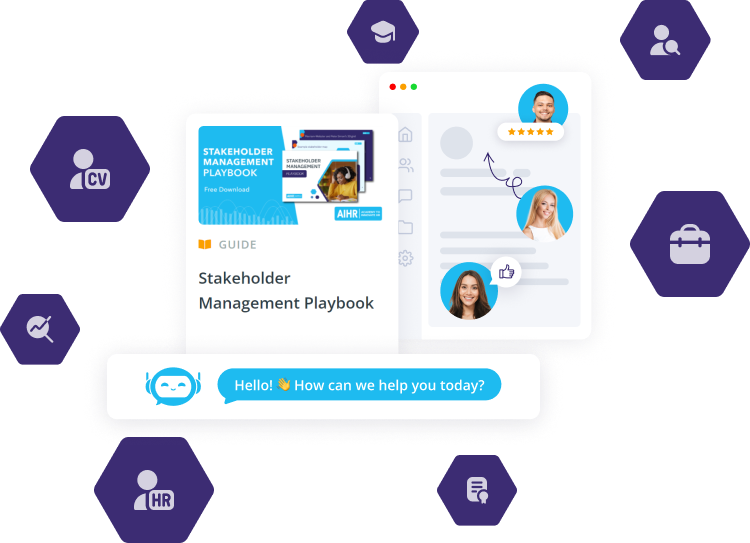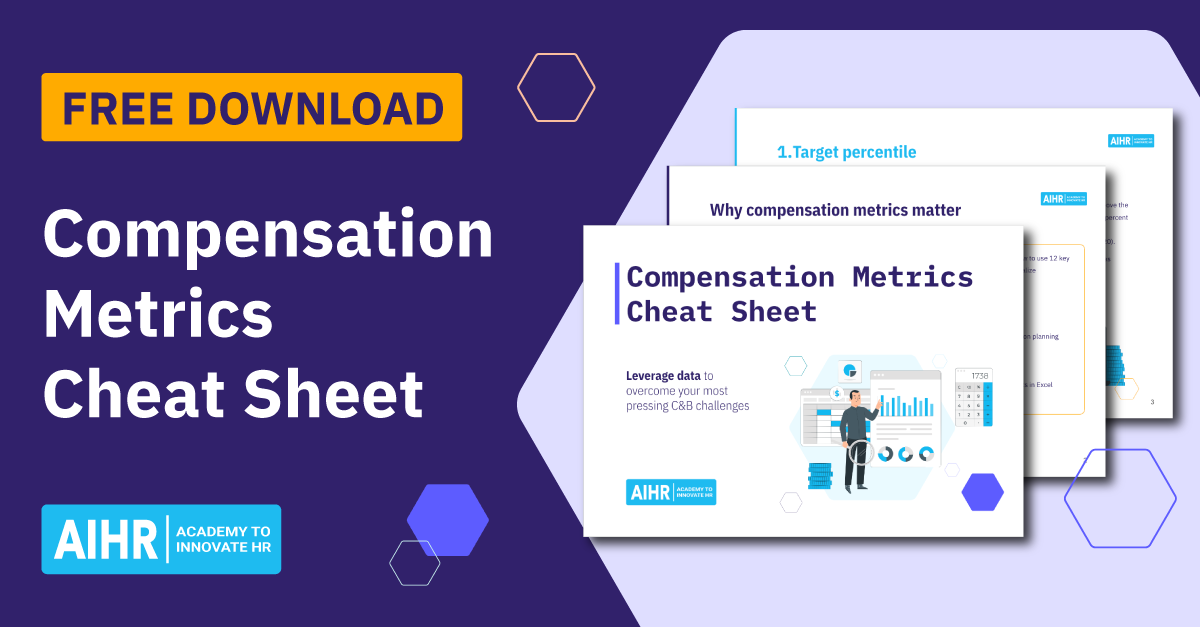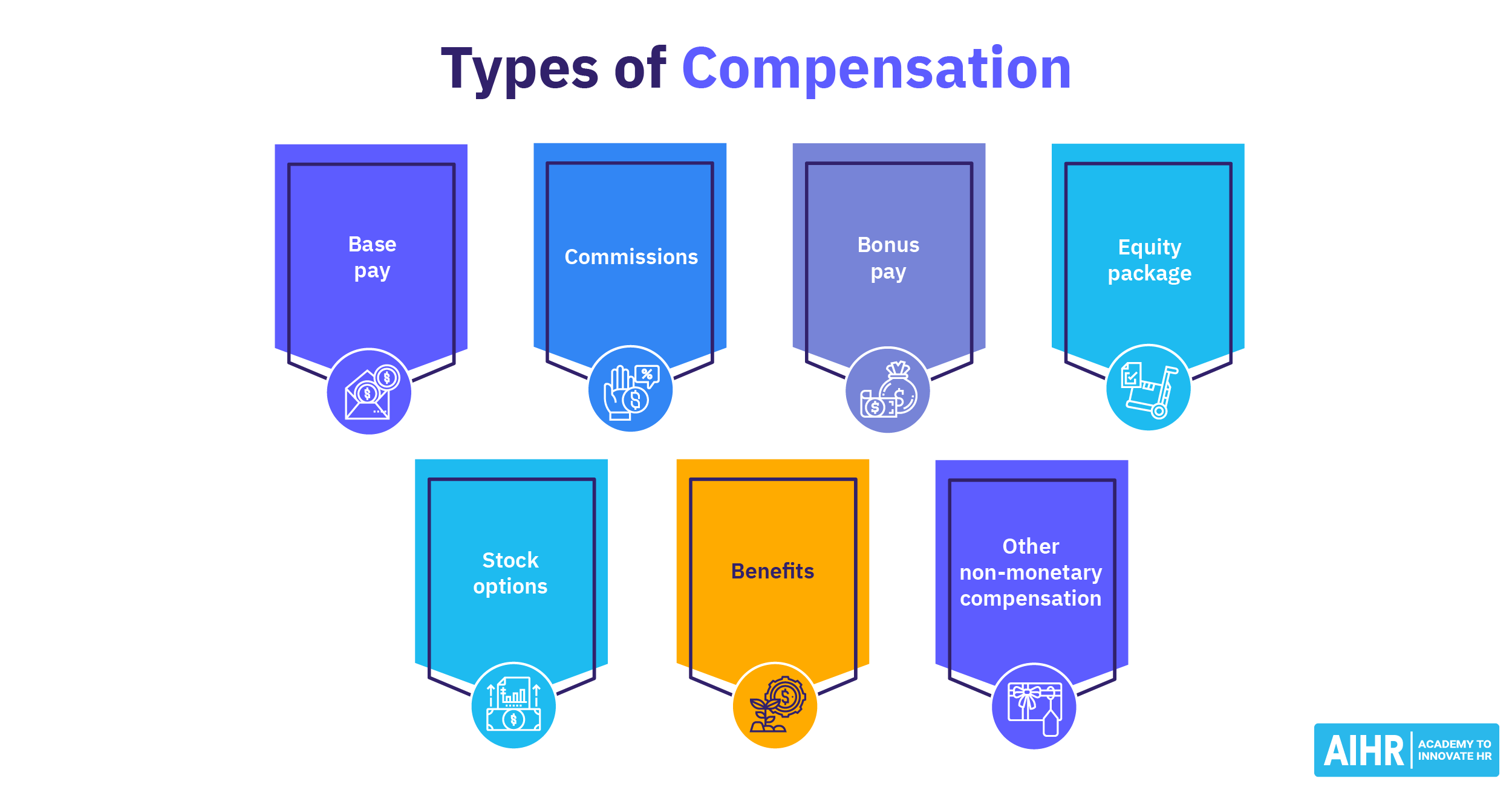Incentive Pay
What is incentive pay?
Incentive pay is additional compensation awarded to employees for achieving measurable goals, specific targets, or critical organizational milestones.
This pay can take different forms, such as cash bonuses, commissions, or profit sharing. However, it can also be non-monetary, such as employee recognition, professional development opportunities, or personalized experiences.
When implemented effectively, incentive pay programs can motivate employees to meet or exceed performance expectations and align their efforts with strategic goals.
How does incentive pay work?
Incentive-based pay works best when handled via a structured system with clear performance expectations linked to additional compensation. Employees should know the specific goals and targets they must reach to earn this extra pay and how they will be rewarded—whether through quarterly bonuses, stock options, or other incentives like gift certificates.
HR or management teams track and monitor progress toward these goals. Once the targets are met, this pay is typically distributed either on specific dates, at the end of a quarter, or after key milestones. The timing can vary depending on how the company’s pay structure is designed.
A well-organized incentive pay system ensures employees understand both the expectations and the rewards. This transparency and structure motivate employees to perform at a higher level, leading to improved engagement and helping with talent retention.
Incentive pay examples
Here are some of the most common incentive pay examples:
- Bonuses: Employees receive a one-time payment for meeting specific targets, like reaching sales goals, completing a major project, or company-wide success.
- Commission: Sales staff receive a percentage of sales revenue for meeting or exceeding sales targets. The more they sell, the more they earn.
- Profit sharing: Employees receive a portion of the company’s profits, usually distributed annually or quarterly.
- Paid time off: Employees get extra paid days off, which they can use as vacation or personal days.
- Stock options: A type of compensation that allows employees to buy company shares, usually at a discounted price. This is a financial incentive that can potentially reward employees significantly if the company stock rises.
- Gift cards: Pre-paid cards or gift certificates employees can use to purchase products, services, or experiences. The amount can vary based on the specific goal or target reached.
- Career development opportunities: Employees get access to professional training, certifications, or tuition reimbursement to help them grow their skills and advance within the company.
- Personalized experiences: Employees have the option to choose from a range of personal experiences like spa treatments, concert tickets, or travel vouchers.
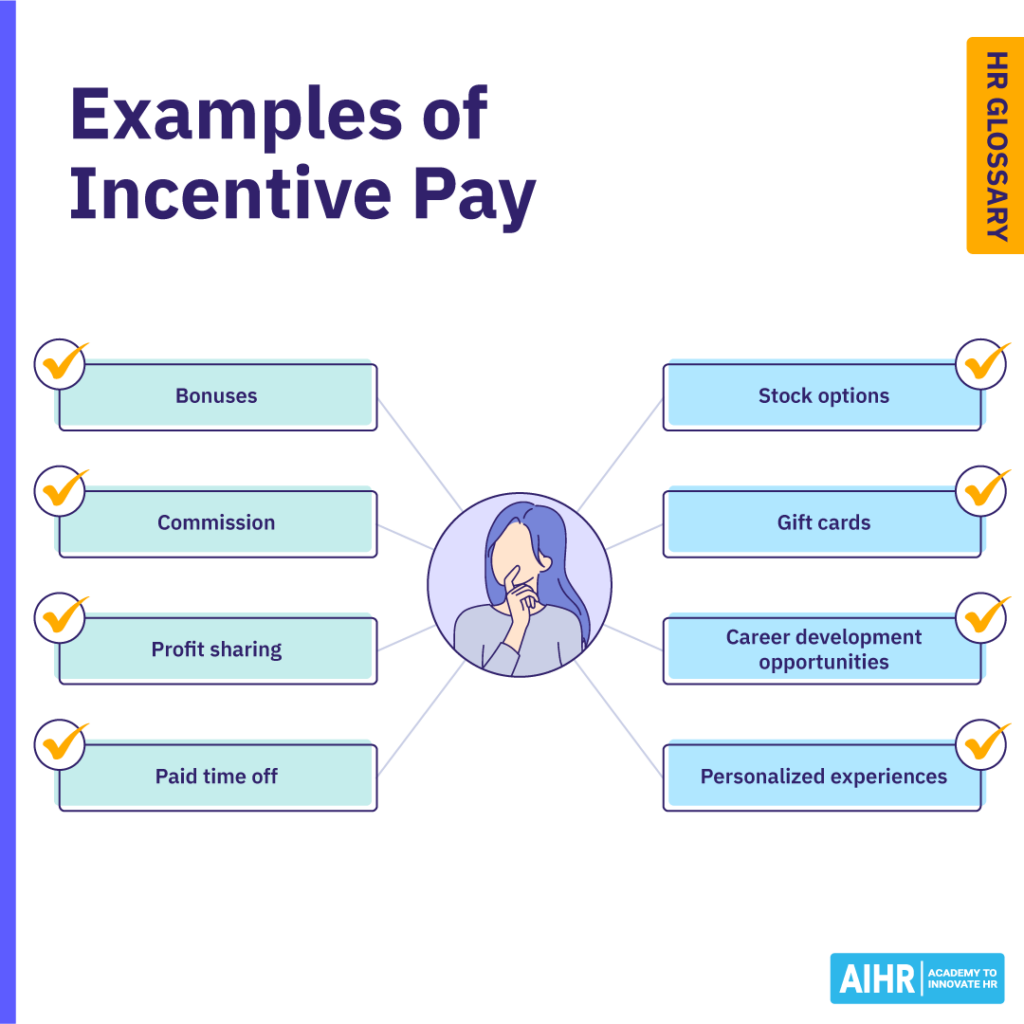
How is incentive pay calculated?
There are several ways HR can calculate incentive pay. Here is an overview of some common methods:
Commission-based
In sales roles, incentive pay is often calculated as a percentage of sales revenue, commonly known as a commission. For example, if a salesperson generates $100,000 in sales with a 5% commission, they’d earn $5,000.
Project-based
In project-based work, a flat-rate bonus is usually awarded to employees or teams for completing a project ahead of schedule or under budget. For example, a marketing team might receive a $10,000 bonus for launching a new product line earlier than planned and exceeding market expectations.
Profit sharing
A multinational consumer goods company gives its 120,000 employees 2% of the company’s annual profits. If the company earns $52 billion in profits and sets aside 2% of that ($1.04 billion) for profit sharing, each employee will receive $8,667 ($1.04 billion divided among 120,000 employees). Under the company’s deferred profit-sharing arrangement, employees receive their benefits over a five-year period.
Company performance
A tech company rewards its employees with an annual bonus of 5% of their base salary if the company reaches its financial targets, such as 20% growth. For example, a software developer earning a base yearly salary of $115,000 would receive $5,750 as an annual bonus if the targets are met.
Is incentive pay taxable?
Incentive pay is considered taxable income by the Internal Revenue Service (IRS). However, the tax rate varies depending on the type of payment. HR professionals can refer to IRS Publication 525 for details on the taxation of fringe benefits or Publication 15 for guidance on supplemental pay. Ensure you regularly review tax rules on incentive pay or get advice from tax experts.
Merit pay vs. incentive pay
HR professionals should be aware of these key differences between merit pay and incentive pay:
Definition
A salary increase based on individual performance
Additional compensation for achieving specific performance targets or goals
Timing
Usually annual
Flexible; usually a one-time bonus or reward that may be awarded once or multiple times a year
Reasons
Encourage consistent, long-term performance
Motivate employees to reach specific goals, targets, or performance outcomes
Permanence of salary increase
Typically becomes a permanent part of an employee’s salary
Non-permanent as it’s considered a supplemental compensation, award, or benefit
Incentive pay vs. bonus
Both incentive pay and bonuses are forms of additional compensation beyond an employee’s salary. Incentive pay is typically tied to specific goals (e.g., sales targets or profit-sharing) and can come in various forms, such as commissions or even gift cards.
While bonuses can be a type of incentive pay (such as project-based rewards), they aren’t always linked to performance targets. They might be given for reasons like exceptional performance, long service, or company-wide successes.
Advantages and disadvantages of incentive pay
Here are some of the top benefits and challenges to consider before implementing incentive-based pay arrangements.
Pros
- Boosts motivation: Employees are often more driven to meet specific targets, knowing their efforts directly impact their earnings.
- Rewards high performers: It provides a direct way to recognize and financially reward employees who consistently exceed expectations, helping retain top talent.
- Improves productivity: When pay is tied to performance, workers tend to focus on completing tasks more competently and efficiently.
- Aligns employee and organizational goals: Incentive-based compensation encourages employees to prioritize organizational objectives, fostering a sense of shared success.
- Improves retention: A well-structured rewards program can help retain employees motivated by the rewards, especially if your company offers better compensation than its competitors.
Cons
- Can create unhealthy competition: In some environments, it can lead to obsessive competitiveness among employees that undermines teamwork and creates tension.
- Quality vs. quantity: Workers might focus on quantity over quality if they are primarily rewarded for output, potentially lowering the standard of work.
- Can cause income inequality: If the criteria for rewards are unclear or perceived as biased, employees may become dissatisfied and disengaged.
- Can lead to unpredictable costs: For companies, incentive-based compensation can be harder to budget for as payouts depend on performance, which may fluctuate.
How can HR implement an incentive pay program?
Step 1. Develop an incentive pay program
To launch your program, you need to:
- Set goals and objectives: Understand your organization’s needs and the likely outcomes of the program.
- Analyze your organization: Determine the business units that would benefit the most from the program.
- Determine the incentives per job category and department: Doing so will help you link them to the specific performance standards each job category and department has for its employees.
Step 2. Implement and communicate the plan
Start implementing the plan, and tie it to a fixed period. You may want to start a trial in one department before rolling it out to the rest of the organization.
Your communication plan should ensure every employee clearly understands the incentive pay program. Use a variety of communication channels to share information about the plan and make the program a regular part of performance discussions between employees and managers.
Step 3. Assess plan performance and risk
Conduct periodic check-ins to determine if the incentive pay program is working. You should avoid having it operate as an “expense” only program. Instead, it should make your organization more effective and profitable. Look at the list of disadvantages above to see if any of them apply to your organization and may bring about unnecessary risk.
As you receive more feedback throughout the program, be sure to consider it so you can carefully implement it wherever needed. It’s a good idea to check the program’s health quarterly, bi-annually, and annually and revise it to meet new organizational goals.
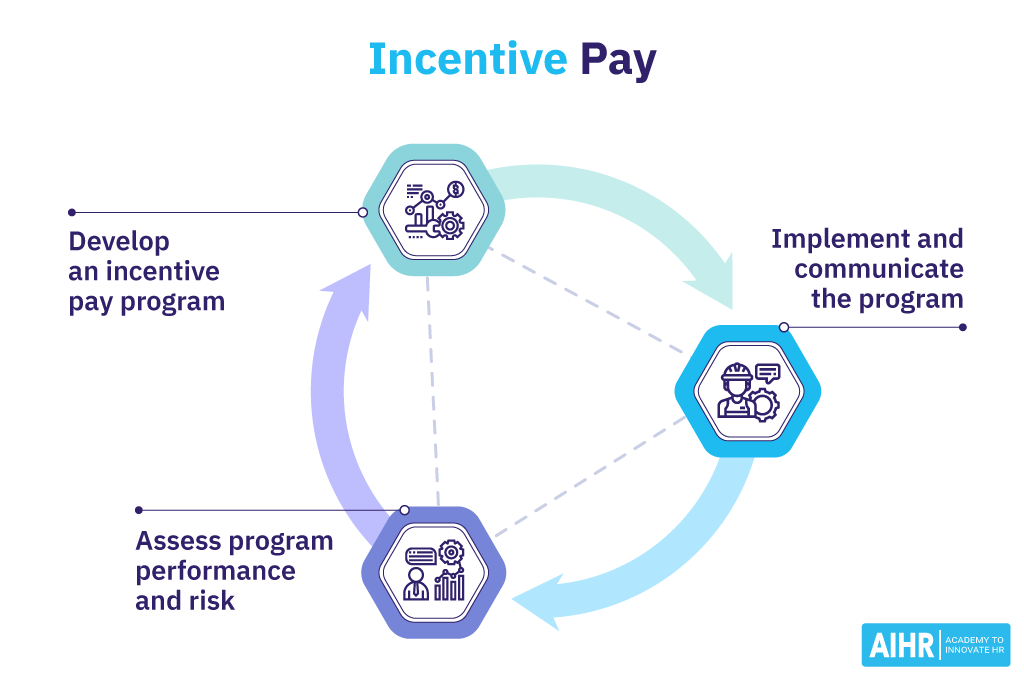
FAQ
Incentive pay is additional compensation awarded to employees based on their performance. It’s typically tied to achieving specific goals or targets and can take various forms, such as commissions, bonuses, or profit-sharing.
No, incentive pay is not the same as a raise. A raise permanently increases an employee’s base salary, while incentive pay is typically a one-time reward based on performance, like bonuses or commissions.
Not always. While bonuses can be a type of incentive pay, incentive pay can also take other forms, like commissions or profit-sharing. Employees may receive bonuses for various reasons that are not tied to specific performance goals.

